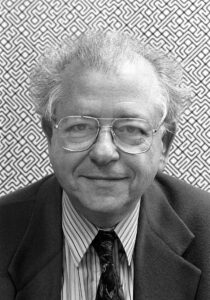Bela Julesz
He began his career as an electrical engineer at the Telecommunications Research Institute. He defended his doctoral thesis in 1956, the topic of which was microwave systems and the theory of television signals.
Subsequently, while working at Bell Laboratories in Murray Hill, USA, his interest turned to brain image processing.
In 1960, he made a new discovery by developing the so-called random-dot stereograms, which radically changed the previous views on spatial vision and provided a new, effective tool for modern vision research, shape recognition and texture image processing systems. With his 1982 Texton theory, he defined and modeled the discriminative elements of human texture perception based on first- and second-order statistics, which could then be applied in computer image processing.
He retired from Bell Labs in 1989 and began teaching at Rutgers University (Piscataway, New Jersey, USA), where he also founded the Laboratory of Vision Research, where he served as director until his death.
He published his findings in over 200 scientific papers. In 1971, he published his seminal and influential book, "Foundations of Cyclopean Perception," on the human spatial vision that combines the images of the two eyes. His book, "Dialogues on Perception," published in 1995, has been available in Hungarian since 2000.
In 1983 he received the "Genious Grant" ("MacArthur Fellowship") (MacArthur Foundation, Chicago). He was an elected member of the Academy of Arts and Sciences (American Academy of Arts and Sciences, USA) from 1980; of the National Academy of Sciences (NAS - American Academy of Sciences, USA) from 1987. He was also an honorary member of the Hungarian Academy of Sciences from 1983.
- His book Foundations of Cyclopean Perception (1971) was selected by the Wayback Machine (a digital archive of the World Wide Web (WWW)) in 2011 as one of the 100 most influential works in cognitive science since the 20th century. Electrical engineer, neurologist, and experimental psychologist in the field of visual perception. /Source: Wikipedia (English)/
Created: 2023.03.19. 15:12
Last modified: 2024.05.29. 22:56

